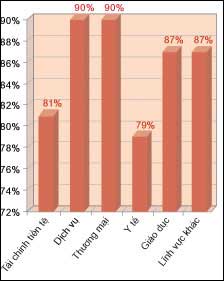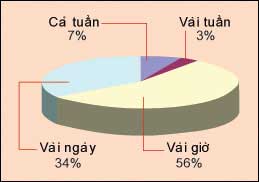In 2005, although users’ awareness of cybersecurity improved, the number of computers infected with viruses in Vietnam remained high. Furthermore, spam, adware, and spyware continued to proliferate.
The sectors most affected by virus infections were commerce (96%), education (95%), and services (94%). A staggering 94% of respondents reported that their computers had been infected with viruses, compared to 97% in 2004.
 The Issues of Spyware, Adware, and Spam
The Issues of Spyware, Adware, and Spam
Spyware and adware continued to be pressing issues, with 87% of respondents indicating that their computers had been troubled by these types of software. Along with the growth of online advertising, Vietnamese users frequently faced disturbances from spam and promotional emails over the past year. In addition to wasting time and causing annoyance, spam has become a significant problem even for the email systems of agencies and companies in Vietnam.
Additionally, 35% of web administrators reported that their websites had never been attacked. Most cyberattacks in the past year were Distributed Denial of Service (DDoS) attacks.
In 2005, a total of 232 new viruses, adware, and spyware were discovered in Vietnam, compared to only 84 viruses in 2004.
Caution with “Harmless” Viruses
One notable difference in 2005 compared to previous years was the absence of viruses intentionally designed to destroy data on infected computers. Consequently, 33% of respondents claimed they were not worried when encountering virus-related issues. However, according to experts from BKIS, this should not lead to complacency; viruses that do not destroy data can still silently steal information, which can be far more dangerous. Moreover, a “harmless” virus can turn into a “killer” in an instant, as whether or not a virus destroys data depends on the mindset of the virus creator.
In 2005, many viruses exploited chat programs to spread, especially Yahoo Messenger. 40% of respondents stated they would carefully verify links sent by others during a chat on Yahoo Messenger. Meanwhile, 37% decided to ignore all such links out of suspicion. Nevertheless, 23% admitted they would click on any link received, which is very risky. According to BKIS experts, one should avoid clicking on links from unknown sources, as they could be traps for viruses to infiltrate your computer.
 Damage Caused by Computer Viruses
Damage Caused by Computer Viruses
It is quite challenging to accurately determine the extent of damage caused by computer viruses to users. BKIS proposed a method to calculate damage based on the number of workdays affected by computer viruses multiplied by the average daily income of the surveyed individuals.
The results showed that the average damage was approximately 260,000 to 410,000 VND per year per computer user. Using this calculation, the total damage across all infected computers nationwide could reach hundreds of billions of VND.
(Source: BKIS Center Report 2005)
Hạnh Lê


















































